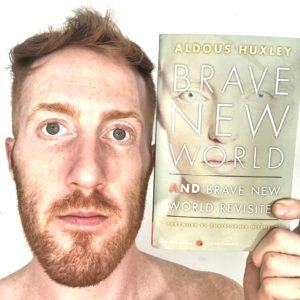 This prophetic novel was published in 1932, depicting a world where one central government has scientifically and psychologically taken over the means of production of the human race. People are grown on assembly lines—some purposefully under-grown so as to serve as the working class. Those who are Alphas have everything they want. Everybody is happy.
This prophetic novel was published in 1932, depicting a world where one central government has scientifically and psychologically taken over the means of production of the human race. People are grown on assembly lines—some purposefully under-grown so as to serve as the working class. Those who are Alphas have everything they want. Everybody is happy.
Truth, science, and reason have all been scarified at the alter of happiness. The mass of regular citizens are all content in their jobs because they don’t and can’t imagine anything else. When they finish their work shift they are rewarded with a ration of soma, which is a soothing happiness-producing drug. Meanwhile the entirety of the elite class is sexually open to any and all partners, has access to a wide variety of games and stimulating pleasurable activities, and are hopped up on soma too. Everything runs smoothly, because everyone is happy.
One day, our perfect world welcomes a stranger, a young man from an old Indian reservation that had remained independent of modern culture throughout the centuries. His arrival was a spectacle, and while at first he desired assimilation, his feelings quickly reversed. He did not understand why nobody had a mother, why nobody had a father, why nobody had a family at all. He didn’t understand the desire for soma and the appeal of mental vacations from the real world. He was heartbroken to see that nobody loved anymore, because love that was lost could potentially cause painful emotions. Everybody was living in a state of perpetual bliss due in large part to their ignorance of the wonderful depth of human feeling. He hated this world without books or religions or differing thought. It was numb.
In George Orwell’s 1984, the government controls the populace through fear and force. Conversely, in Aldous Huxley’s Brave New World, the government has satiated everyone with endless amusement and distraction. Both men foresaw the future as a world dominated by tyrannical governments; Orwell envisioned one created via violence and punishment, whereas Huxley’s was brought into existence by positive reenforcement and non-violent manipulation. While Huxley set his dystopian society 700 years in the future, it is amazing how many of his ideas have become true or partially true within the first century after its original publication. How many of us today are politically mute in favor of reality television and drug use? It has become excessively easy to choose the comforts of cheap perennial entertainment and contrived happiness over the pursuits of truth and knowledge.
The message between the lines is clear: we should all be wary of a system designed to desensitize us as individuals and distract us with shiny objects. The more we give in to the desire for creature comforts, the less fight we reserve for opposing tyrannical ideas and people. Everybody needs occasional leisure time, but do not let that become the norm. Comfort should be respected and not expected, because if we’re not careful, one day humanity will wake up and find itself devoid of all freedoms. If that day should ever dawn, we will most likely only have ourselves to blame.


Leave a Reply